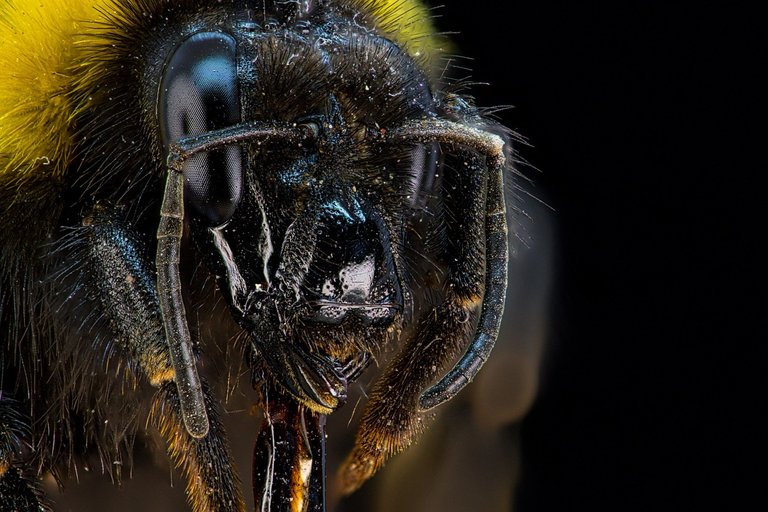The Buzz creating a buzz in the Bee World- My Reaction
Great minds of @stemsocial community and of course visitors here to read some cool, fun, and educative blog posts. If you are looking to create a buzz to your reservoir of knowledge, then sit back, be comfy, and let's buzz about something that's been creating quite a buzz in the world of bees.
Yes, we're diving deep into the mysterious phenomenon known as Colony Collapse Disorder, or as I like to call it, the rather Houdini act of the bee world. I stumbled upon it first in @futurekr post here in @stemsocial community and it was quite informative, then of course naturally I did more research as it was quite fascinating
Now lets buzz shall we...

Ooohkay!! lets say we have a bustling bee colony, full of workers buzzing around, collecting nectar, and doing their pollination magic. But then, one day, poof! out of the blues, The majority of those hardworking bees vanish into thin air, leaving the queen behind like a bewildered monarch. It's like a bee version of "Now You See Me," but without the magic tricks or Jesse Eisenberg right.
Now, I have to admit, these bees are quite considerate. They leave behind plenty of food for the queen and the immature bees. It's like they're saying, "Hey!!! , we're outta here, but we've got ya' back, Your Majesty!" (with the bowing reaction) Talk about a royal treatment.
So, back in 2005, beekeepers in the USA started noticing this disappearing act happening on a large scale. It was like a bee version of "The Hunger Games," but without Jennifer Lawrence or archery skills. The law of thirds was in full swing, with one-third of the colonies found dead, one-third weak, and the other one-third seemingly fine. It was a real mystery that even Sherlock Holmes would find puzzling.
Scientists, being the busy bees they are, started investigating this phenomenon. They discovered a sneaky virus called the Israeli acute paralysis virus (IAPV), which was present in all the colonies experiencing Colony Collapse Disorder (CCD). It's like the IAPV decided to take a vacation in the USA without a return ticket. But hold on, that wasn't enough evidence to point fingers at the virus as the sole culprit as at then.
Now, if you would follow me, let me take you on a journey back in time. It turns out that large-scale losses of bee colonies have been documented since 1869. We're talking about a long history of bees pulling their vanishing act. In the late 1800s, there was even a condition called May disease. Bees would disappear or decline rapidly, leaving beekeepers scratching their heads. It's like bees have been practicing their magic tricks for centuries.
But why should we care about these bees? Well, my friends, honey bee pollination is the reason humans can enjoy around $15 billion worth of crops in the United States each year. That's a lot of fruits and veggies on our plates! And let's not forget about the almonds, berries, and cherries that rely exclusively on our dear honey bees for pollination. Without these hardworking bees, our taste buds would be in for a sad and bland experience.
Now, scientists have been busy bees themselves, trying to crack the case of CCD. They suspect a combination of stressors, pathogens, and even chemical contamination could be to blame. It's like the bees are caught in a real-life version of "The Avengers," facing a powerful enemy made up of multiple villains. Only instead of superheroes, we have researchers in lab coats trying to solve the mystery.
So, my friends, as we ponder the enigma of Colony Collapse Disorder, let's appreciate the incredible role bees play in our ecosystem. They're like nature's tiny superheroes, ensuring our crops thrive and our plates are filled with deliciousness. The disappearing act may be baffling, but let's continue to support research and conservation efforts to protect our buzzing friends.
Remember, the next time you enjoy a juicy piece of fruit or taste the sweetness of honey, give a nod to the unsung heroes behind it all: the bees. And if you ever see one of those sneaky bees performing magic tricks, make sure to ask them where they've hidden all their buddies. Keep buzzing, keep laughing, and let's protect our precious pollinators. Thank you, and bee awesome!
Share your fascinating science based knowledge on @stemsocial, we would be happy, as no one is an island of knowledge, Sayonara 🖐️
References
https://www.britannica.com/science/colony-collapse-disorder/Impacts-on-honeybee-health
https://www.epa.gov/pollinator-protection/colony-collapse-disorder
https://www.ncbi.nlm.nih.gov/pmc/articles/PMC2715894/
https://www.pbs.org/wnet/nature/blog/silence-bees-mystery-missing-bees-covered-retroreport/
https://www.invasivespeciesinfo.gov/subject/colony-collapse-disorder
https://www.dadant.com/learn/colony-collapse-disorder-how-do-beekeepers-prevent-it/
Ah no! Bees should abolish the disappearing act and stay with us. We need them a lot. They're indeed a vital part of the ecosystem. Great post!
Frankly before now, I knew bees were important for plant reproduction and all, but i didnt know hiw so important they were , we cant afford to lose a large percentage of them really
Thanks for your contribution to the STEMsocial community. Feel free to join us on discord to get to know the rest of us!
Please consider delegating to the @stemsocial account (85% of the curation rewards are returned).
You may also include @stemsocial as a beneficiary of the rewards of this post to get a stronger support.